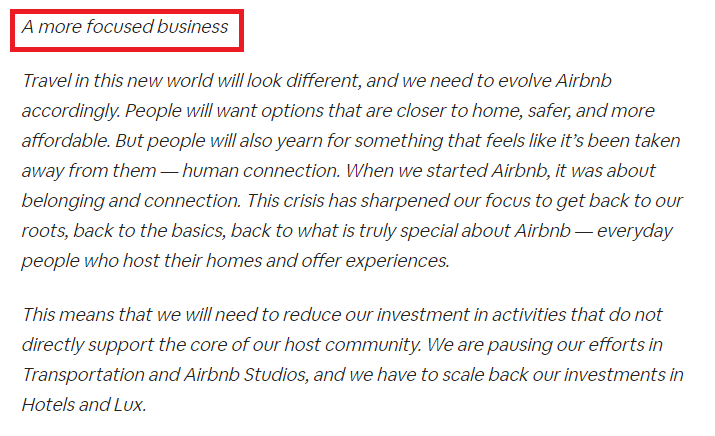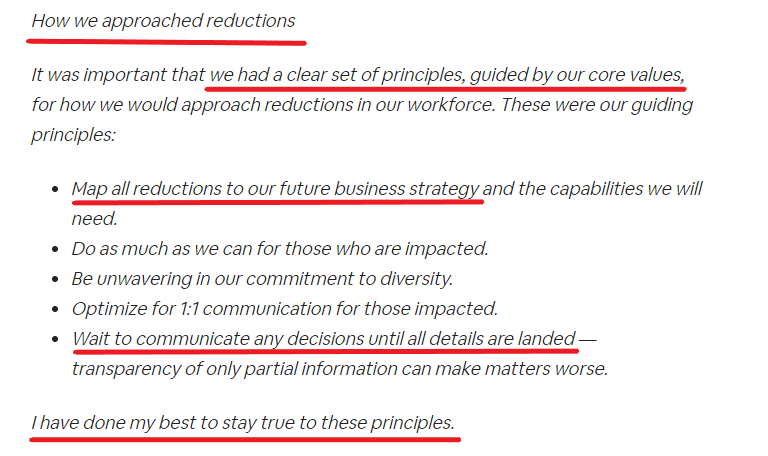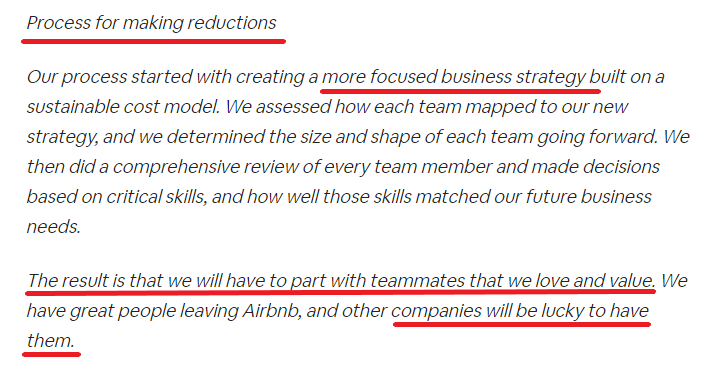
Layoffs are hard but to be one breaking the news requires another level of leadership, compassion, and empathy. Brian Chesky just showed the world how to do it the right way.
I have learned about the right way to let people go from Ben Horowitz’s gospel ‘The Hard Thing About Hard Things’ in which he narrated his experience of how recovered the company from ‘consecutive layoffs’ and achieved a billion-dollar-plus outcome. In retrospect, how should you keep the cultural continuity and retain your best employees despite massive layoffs? Well, by doing the layoffs right, in a way that’s respectful, compassionate, and pragmatic.
This may sound nutty — how can you do something that’s fundamentally wrong in “the right way?”
Layoffs are not a great experience for anyone, and especially not for those losing their jobs. But Chesky’s memo to the company is a blueprint on how leaders should conduct layoffs.
It’s rare to find such an example these days. Last month, electric scooter company Bird shocked hundreds of employees in a modern “Black Mirror” style by inviting impacted workers on a 90 second long one-way (pre-recorded?) Zoom call in which a disembodied voice read a script informing them that they had been laid off, leaving employees in utter chaos and confused about the situation and next steps. More recently, Uber did the same mistake by laying off 3,500 employees on a 3-minute long Zoom call.
The management team at Airbnb took a different approach. Although the news of such a large layoff is painful for everyone, the company really made an effort to lead with transparency. I think that everyone should read Chesky’s letter in full. Even when broken down, it’s quite a lesson in how to talk to your team in hard times.
I’ve unpacked the memo for you and outlined a few of the characteristics of great leadership that we can all learn and follow in tough times. I hope you find it useful during difficult conversations in personal and professional life, so let’s dive in:
Personalized, Caring, and Forthright:
Chesky starts by saying, “This is my seventh time talking to you from my house”. This is a clear indication that he cares enough about his employees to remember how many times they have interacted during this period. Then he leads with empathy and gets to the point — he has some very sad news to share.

He goes on to echo the company’s mission of being centered around belonging, which then becomes the theme for the remainder of his memo. He lists out what he’ll be covering, setting a clear purpose and tone of his message.
Honest, Open, and Transparent
Chesky moves on by giving as many details and context as he can to answer the questions raised by layoffs: Why is it happening? How did the company come to this conclusion? What measure did the company take to avoid it?

He showcases humility in acknowledging that he doesn’t have all the answers (rather than being Mr. ‘I-Know-Everything’ CEO) and that we are in this unknown and uncharted territory together.

Further, he elaborates a strategic argument on how the company came to the conclusion of “reducing the size of our workforce around a more focused business strategy”.
Detailing the decision process
Often job losses are communicated by CEOs without mentioning how the decision was made. This makes the staff who are staying and the people who are leaving confused.
When confusion arises, assumptions are made. And assumptions infuse the toxic culture in the company. Chesky revealed his decision-making process because he understands transparency breeds confidence and loyalty in uncertain times — Those two things are how you rebuild a business after a downturn.

Chesky reiterates the “why” — He takes an extra effort to educate the audience about the status of the travel industry and predicts what his customers may want in the future, their behaviors may change, and how what has happened might influence their buying behavior within his industry. Case in point: Customers will want options, safety, and affordability.
That means staff who worked in areas not aligned with the business strategy will most likely be let go. He realigns the focus only on activities that support the core value proposition and pause or eliminates everything else until the balance sheet can reboot those lines of business.
Emotional Intelligence (EQ)
As soon as you get made redundant — you started doubting yourself. Chesky listed as one of his “guiding principles” in conducting the layoffs the desire to “map all reductions to our future business strategy and the capabilities we will need.” He reiterated that the business’ strategic direction and financial situation guide the decision — “The positions are what’s eliminated, not the people.”

I really appreciate him mentioning that (…” other companies will be lucky to have them.”) It reinforces that the people who are being let go are talented, and he hopes that other companies (even his competitors) will hire them.
Principled
Making a decision to fire good people who have a good relationship with you is not easy. You can be biased in the process if you don’t have principles to guide you. Chesky used these principles when firing 25% of his workforce. It is evident that the layoffs were about positions and skills, which are more easily quantifiable and justifiable than how much the CEO likes someone.

It’s important to identify how and why positions will be eliminated. Otherwise, executives are vulnerable to subjectivity seeping in — and to employees accusing them of making biased decisions.
Chesky also mentioned that management opted to “wait to communicate any decisions until all details are landed” because “transparency of only partial information can make matters worse.” This decision to keep news of the impending layoffs private was wise. Not keeping information about layoffs confidential until you’re ready to make the announcement can lead to rumors — and terror — spreading throughout the staff.
Action-Oriented
Not knowing what comes next is the worst kind of feeling. Chesky understands the importance of providing clarity to all his employees as soon as possible, while also considering the fact that they employ people in 24 countries, all of which have different laws and practices on notifications about employment.

Mission Centered
Chesky reaffirmed and realigned the business strategy to be the North Star in the whole process and how each and every employee was assessed against the same business strategy before pulling the trigger. He further restates the results of this decision making (…“we have to part with valuable members of our team.”)

Throughout the memo, he was considerate enough not to use layoff, firing, or let go — the phrase ‘…we will have to part with teammates that we love and value’ just makes people feel better under these unusual circumstances.
Compassion and Respect
The most important piece of the memo is that it acknowledged what a disruptive life event layoffs could be. Employees may not know where their next paycheck is coming from, or whether they can afford their next visit to a doctor. In the current economic environment, they may not be certain they can find another job.

Chesky clearly outlined what would happen to employees’ benefits after they leave. Specifically, employees in the US are to receive at least 14 weeks of severance pay, with additional severance pay available depending on employees’ tenure at the company. Employees in the US are also supposed to receive 12 months of health insurance coverage beyond their departure date. (In all other countries, health insurance extends until the end of 2020.)
Ethical
Most notably, Chesky had dropped the one-year cliff on equity for every one the company had hired in the past year. That means they don’t have to wait one year, as they typically would, for their stock options to vest.

The employees who are let go should remain, owners of the business, they helped build. It’s a reflection of their hard work and a lifelong reminder of what they were a part of. Giving equity to redundant employees helps them have a vested interest in the future of the company and leaves the door slightly open if they want to return one day.
Gratitude and Inspiration
Departing employees will receive relatively substantial support as they look for a new job, including an alumni placement team, made up of some Airbnb recruiters tasked with helping to find departing employees a role at another company. Those employees also have access to a company that specializes in career-transition and job-placement services. And they’re allowed to keep their company laptop, which Chesky mentioned was an important tool in finding a new job.

By allowing company information to be accessed by the public and future employers, he has made it easier for the staff who are leaving to be successful in interviews and have clear evidence to back up their claims.
Making it easier for redundant staff to get their next job is always the right thing. Companies that truly care for their employees and show it through their actions have a huge, invisible, competitive advantage. Chesky was so thoughtful of people who were leaving that they would need a computer to do an effective job search. Knowing that a new Mac was going to cost an unemployed person a lot of money, he made the bold choice to give them their laptop. That laptop with an Airbnb sticker will forever be a reminder to that person of thoughtful support during tough times.
These provisions for employees are important not solely because they’re the right thing to do. The business case for taking care of employees after layoffs is that they’re more inclined to stay loyal to the company — This is the moment where brands are built or brands are dented.
When former employees, say, write reviews on Glassdoor, they won’t say terrible things that will dissuade prospective hires from applying if they were shown compassion. And should Airbnb ever want to hire these folks back, they’ll remember how respectfully they were treated at this time. It will make a big difference.
Encouraging and Courteous
Chesky dedicated a few lines of the memo to the Airbnb employees whose positions were not cut — It’s important to explain to remaining employees how the layoffs would affect the organization. They’re going to start thinking about moving to competitors. They’re going to start getting poached. They’re going to start losing faith and confidence in your leadership if not dealt with care and attention.

The employees who stay will care deeply about how you treat their colleagues. Many of the people that you lay off will have closer relationships with the people who stay than you do, so treat them with the appropriate level of respect.
Finally, he signs with his first name ‘Brian’, giving an impersonal touch. He uses simple and easy words, making his letter less formal and easier to be read both by Airbnb’ s employees and customers across the world.
Final Thoughts:
Chesky’s full memo provides clarity to the fullest and left no room for assumptions or hypotheses. During tough times, clarity provides calmness rather than chaos. While those words probably don’t own their own soften the blow of suddenly not having a job, the expensive measures are taken to protect the financial and medical well-being of those laid off the can. And those efforts make those words feel authentic rather than hollow. Overall, it provides a holistic picture to anyone reading the memo on the company’s tough times, strategic realignment, and decision leading up to layoff decisions.
Chesky took vulnerability, uncertainty, emotion, and heart, and used it for good. Do you also think this letter may become a bar for how layoffs are measured in uncertain times?
References: https://bit.ly/36ar2wu












